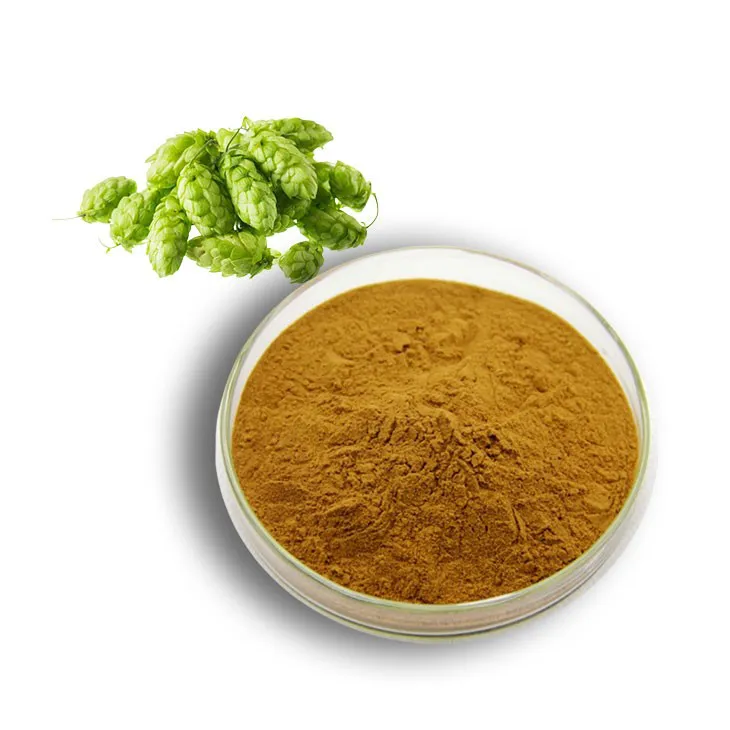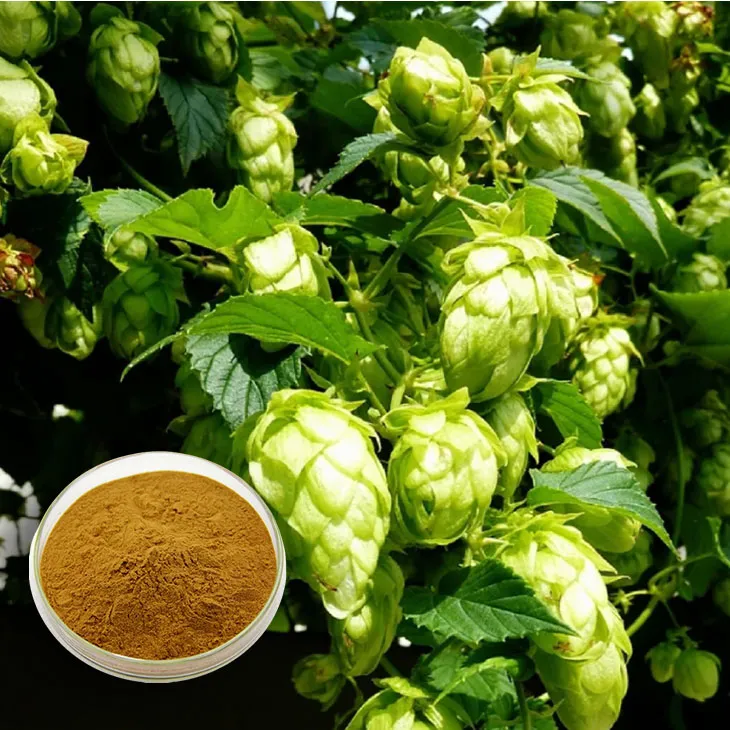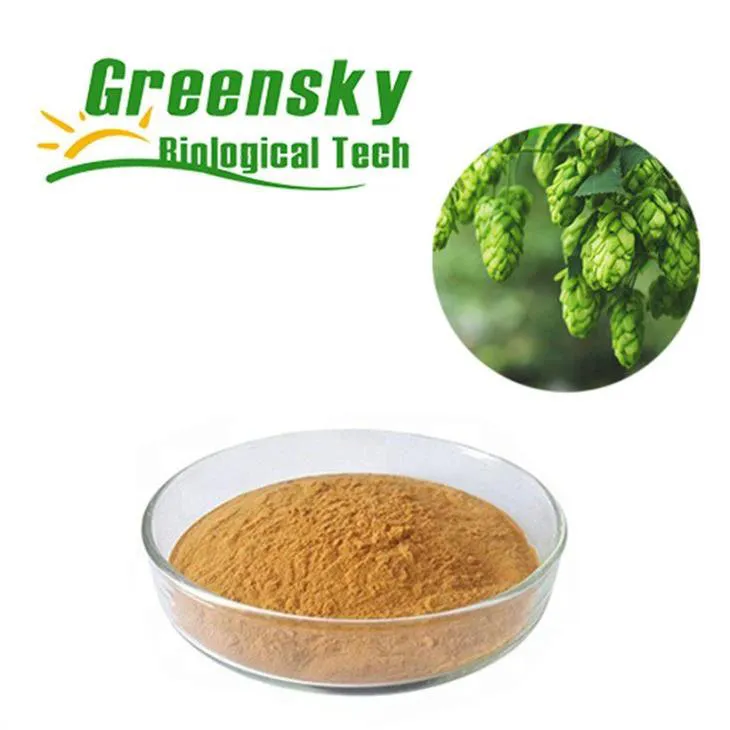- 0086-571-85302990
- sales@greenskybio.com
Two Bases for the Quality of Hops Extract: Potency and Purity
2024-12-21

1. Introduction
Beer has been a beloved beverage for centuries, and hops play a crucial role in its production. Hops Extract, a concentrated form of hops, has become increasingly important in the brewing industry and in other applications. Potency and purity are two fundamental aspects that determine the quality of Hops Extract. Understanding these elements is essential for producers, consumers, and those interested in the various uses of Hops Extract.

2. Potency of Hops Extract
2.1. Definition and Measurement
Potency refers to the strength or effectiveness of the hops extract. In the context of brewing, it is often measured in terms of alpha - acids. Alpha - acids are the primary components in hops that contribute to bitterness in beer. The higher the alpha - acid content, the more potent the hops extract in terms of its bittering potential. Brewers use this measurement to calculate the amount of hops extract needed to achieve the desired level of bitterness in their beer. For example, a hops extract with a high alpha - acid content may be used in smaller quantities compared to one with a lower content to achieve the same level of bitterness.
2.2. Impact on Flavor
- Beyond bitterness, potency also affects the overall flavor profile of beer. Hops contain a variety of essential oils and other compounds that contribute to flavors such as floral, fruity, and spicy notes.
- A more potent hops extract can impart a stronger and more distinct flavor to the beer. For instance, a highly potent extract rich in certain essential oils can give the beer a pronounced citrusy or piney flavor, depending on the specific compounds present.
- However, achieving the right balance of potency is crucial. Too much potency can lead to an overpowering flavor, while too little may result in a flat or uninteresting taste.
2.3. Medicinal and Therapeutic Potency
Hops extract has also been used for medicinal purposes. In this context, potency is related to its active compounds' effectiveness.
- Hops contain compounds such as humulones and lupulones, which have been shown to have anti - inflammatory properties. The potency of these compounds in the extract can determine how well it can reduce inflammation in the body.
- Some studies suggest that hops extract may have sedative effects. The potency of the relevant compounds in the extract can influence its ability to promote relaxation and sleep.

3. Purity of Hops Extract
3.1. Definition and Importance
Purity in hops extract refers to the absence of contaminants and the high quality of the raw materials used. Contaminants can include pesticides, heavy metals, and other impurities that may find their way into the hops during cultivation or processing. High - purity hops extract is essential for several reasons.
- First, it ensures the safety of consumers. For example, if there are pesticide residues in the hops extract used in beer production, it could pose a health risk to those who consume the beer.
- Second, purity is crucial for maintaining the consistent quality of the final product. In brewing, any impurities in the hops extract can affect the taste, aroma, and stability of the beer.
3.2. Ensuring Purity during Cultivation
- Organic farming practices play a significant role in ensuring the purity of hops. By avoiding the use of synthetic pesticides and fertilizers, organic hops growers can reduce the risk of pesticide and chemical contamination in the hops.
- Proper soil management is also important. Healthy soil can produce healthier hops plants, which are more resistant to pests and diseases, reducing the need for chemical interventions.
- Regular testing of the soil and the hops during cultivation can help detect any potential contaminants early on, allowing for corrective measures to be taken.
3.3. Processing and Quality Control for Purity
- During the processing of hops into extract, strict quality control measures should be in place. This includes proper cleaning of the equipment to prevent cross - contamination.
- Advanced filtration techniques can be used to remove impurities such as particulate matter, which can affect the clarity and quality of the extract.
- Testing for contaminants at various stages of processing is essential. This can involve laboratory analysis for pesticides, heavy metals, and other unwanted substances.

4. Interplay between Potency and Purity
The potency and purity of hops extract are not independent factors but are closely intertwined.
- A high - purity hops extract provides a more accurate measure of potency. If there are contaminants present, they can interfere with the analysis of alpha - acids and other components related to potency, leading to inaccurate potency measurements.
- On the other hand, maintaining the potency of the extract can also have an impact on purity. For example, during the extraction process, if the conditions are not properly controlled to preserve the potency of the active compounds, it can also lead to the formation of unwanted by - products, which can affect the purity of the extract.
5. Conclusion
In conclusion, potency and purity are two critical bases for the quality of hops extract. Whether it is for the brewing of delicious and high - quality beer or for medicinal and therapeutic applications, understanding and ensuring these two aspects are of utmost importance. Producers need to implement strict cultivation and processing practices to achieve high - potency and high - purity hops extract. Consumers can also benefit from being aware of these factors, as it can help them make more informed choices when selecting beer or hops - related products. As the demand for hops extract continues to grow in various industries, maintaining high standards of potency and purity will be key to its long - term success and the satisfaction of all stakeholders.
FAQ:
What is the importance of potency in hops extract?
Potency in hops extract is crucial as it determines how effectively the extract can perform its functions. In the context of beer, a potent hops extract can significantly enhance the flavor profile, contributing to the bitterness, aroma, and overall taste of the beer. For medicinal uses, the potency affects its therapeutic capabilities, such as its potential anti - inflammatory or sedative properties.
How is the purity of hops extract measured?
The purity of hops extract can be measured through various methods. One common approach is through chemical analysis to identify and quantify any impurities or contaminants. This may include tests for heavy metals, pesticides, and other substances that should not be present in high - quality hops extract. Chromatography techniques can also be used to separate and analyze the components of the extract to ensure that it contains only the desired compounds related to hops and not any unwanted additives or by - products.
Can high potency in hops extract have any negative impacts?
While high potency in hops extract can be beneficial in many ways, it can also potentially have negative impacts. In beer production, if the potency is too high, it may result in an overly bitter or unbalanced flavor. In medicinal applications, excessive potency may lead to unwanted side effects if not properly dosed. Additionally, if the extract is not properly processed, a very high - potency extract may be more difficult to handle and store, potentially leading to degradation or instability.
What are the common contaminants that can affect the purity of hops extract?
Common contaminants that can affect the purity of hops extract include pesticides from agricultural practices, heavy metals from the soil or water sources in the growing area, and microbial contaminants. Pesticide residues can be harmful if present in significant amounts and may also affect the taste and safety of the extract. Heavy metals like lead or mercury can pose serious health risks. Microbial contaminants such as bacteria or fungi can cause spoilage and may also produce toxins that are dangerous for consumption.
How does the quality of hops extract (potency and purity) affect the final product of beer?
The potency of hops extract directly affects the flavor and aroma of beer. A high - potency extract can add a strong bitterness, floral or citrusy aromas, and other characteristic flavors. Purity is equally important as contaminants can introduce off - flavors or pose health risks. If the hops extract is impure, it may lead to a beer with a strange taste or even be unsafe for consumption. Moreover, an extract with the right balance of potency and purity helps in creating a well - balanced, high - quality beer with consistent taste and quality.
Related literature
- Analysis of Hops Extract: Potency and Purity Determination"
- "The Significance of Potency and Purity in Hops Extract for Brewing"
- "Evaluating the Quality of Hops Extract: Focus on Potency and Purity"
- ▶ Hesperidin
- ▶ citrus bioflavonoids
- ▶ plant extract
- ▶ lycopene
- ▶ Diosmin
- ▶ Grape seed extract
- ▶ Sea buckthorn Juice Powder
- ▶ Beetroot powder
- ▶ Hops Extract
- ▶ Artichoke Extract
- ▶ Reishi mushroom extract
- ▶ Astaxanthin
- ▶ Green Tea Extract
- ▶ Curcumin Extract
- ▶ Horse Chestnut Extract
- ▶ Other Problems
- ▶ Boswellia Serrata Extract
- ▶ Resveratrol Extract
- ▶ Marigold Extract
- ▶ Grape Leaf Extract
- ▶ blog3
- ▶ blog4
- ▶ blog5
-
Certified Organic Almond Extract Powder Set.
2024-12-21
-
Black Garlic Extract
2024-12-21
-
Shikone Extract
2024-12-21
-
Bamboo Leaf extract
2024-12-21
-
Tongkat Ali Extract
2024-12-21
-
Andrographis Paniculata Extract Powder
2024-12-21
-
Polygonum multiflorum extract
2024-12-21
-
Maca Extract
2024-12-21
-
Longan Extract
2024-12-21
-
Dan Shen Root Extract/Salvia Root Extract
2024-12-21
-
Gynostemma pentaphyllum extract
2024-12-21





















